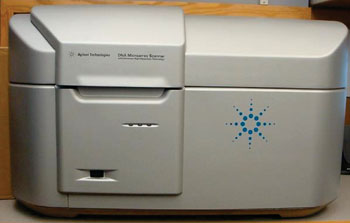Method Developed Predicts Disease Activity in Multiple Sclerosis
By LabMedica International staff writers
Posted on 28 Sep 2016
Multiple sclerosis, or MS, is an inflammatory disease of the central nervous system that mainly affects young adults and it is not currently possible to know which individuals with multiple sclerosis, a life-long condition, risk developing severe disease.Posted on 28 Sep 2016
Biomarkers are naturally occurring substances in the body that can be measured in, for example, blood and that mirror a condition in the body and they are used in medical care to follow the progression of a disease and measure the effect of a treatment.

Image: The C Scanner high-resolution microarray scanner (Photo courtesy of Agilent Technologies).
Scientists at the Linköping University (Sweden) isolated CD4+ T cells were isolated from 16 women diagnosed with definite relapsing-remitting MS. None of the patients had experienced a relapse within three months prior to blood sampling nor had received immunomodulatory or immunosuppressive treatment for at least two months (one exception was intravenous immunoglobulin treatment given 15 days before treatment in one patient). 16 age-matched, healthy control women were recruited among blood donors. To validate the clinical classifying capacity at the protein level, plasma and cerebrospinal fluid (CSF) from a second cohort of 41 patients with early MS was used.
Peripheral blood mononuclear cells (PBMCs) were isolated from whole blood by density centrifugation (Lymphoprep, Axis-Shield, Oslo, Norway). The scientists used a variety of techniques including cell culture, flow cytometry staining and analysis, ribonucleic acid (RNA) extraction and microarray analysis, and these arrays were scanned on an Agilent Microarray Scanner (Agilent Technologies, Santa Clara, CA, USA). Cytokines and chemokines were also quantified.
The scientists tested whether in vitro activation of MS patient-derived CD4+ T cells could reveal potential biomarkers. The dynamic gene expression response to activation was dysregulated in patient-derived CD4+ T cells. By integrating their findings with genome-wide association studies, they constructed a highly connected MS gene module, disclosing cell activation and chemotaxis as central components. Changes in several module genes were associated with differences in protein levels, which were measurable in CSF and were used to classify patients from control individuals. In addition, these measurements could predict disease activity after two years and distinguish low and high responders to treatment in two additional, independent cohorts.
Mika Gustafsson, PhD, a bioinformatics specialist who co-led the study, said, “We have been able to study in detail changes in the immune cells of patients, and been able to identify important proteins. This has led us to a biomarker that can predict how the disease will progress in the patient.” The study was published on September 13, 2016, in the journal Cell Reports.
Related Links:
Linköping University
Axis-Shield
Agilent Technologies













